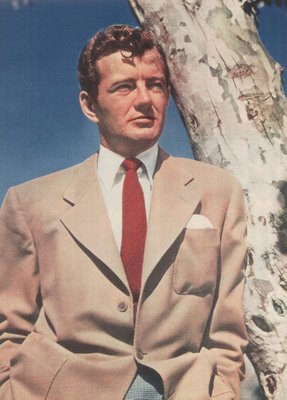

Monday Glamour Starter --- Jennifer Jones --- Part One
 Permit me, if you will, to recast the story of The Devil and Daniel Webster with Phylis Isley, Robert Walker, and David O. Selznick. Phylis is the young actress burning with ambition to become a great star. So far, she’s only managed some stage parts and a brief contract with Republic Pictures, but Phylis isn’t satisfied playing support to serial stalwart Ralph Byrd in Dick Tracy’s G-Men, so her Tulsa exhibitor father uses his influence (along with that of his theatre chain) in persuading Herb Yates to release her from "B" studio bondage. Bob Walker’s the boyish thesp who met Phylis back when they were struggling in New York --- but wait, Phylis never had to struggle, at least not in the sense most actors do --- well-to-do parents bankroll performing ventures and set her up nicely in Gotham. Bob and Phylis (now married) eventually settle in Hollywood, but so far it’s Bob getting the plums, via $400 a week on radio. Enter the estimable Mr. Scratch --- in the person of David O. Selznick --- bearing contracts, fur jackets, and promises of glittering success for a newly christened Jennifer Jones. His Faustian bargain --- allow me to guide your destiny and I shall make of you the most cherished and sought-after name in motion pictures. And so Phylis submits herself to Selznick’s handling, and basks in a waiting public’s adulation. She has to sacrifice Robert Walker, but what’s that against an Academy Award? Golden coin rains down upon her, but Mephistopheles Selznick exacts a price beyond even the forfeit of a husband. Indeed, he exerts such obsessive control as to take away much of the joy her stardom might otherwise confer, and collaborations like Portrait Of Jennie, Terminal Station, and A Farewell To Arms add up to a price paid in damnation for the unholy compact these two have sealed.
Permit me, if you will, to recast the story of The Devil and Daniel Webster with Phylis Isley, Robert Walker, and David O. Selznick. Phylis is the young actress burning with ambition to become a great star. So far, she’s only managed some stage parts and a brief contract with Republic Pictures, but Phylis isn’t satisfied playing support to serial stalwart Ralph Byrd in Dick Tracy’s G-Men, so her Tulsa exhibitor father uses his influence (along with that of his theatre chain) in persuading Herb Yates to release her from "B" studio bondage. Bob Walker’s the boyish thesp who met Phylis back when they were struggling in New York --- but wait, Phylis never had to struggle, at least not in the sense most actors do --- well-to-do parents bankroll performing ventures and set her up nicely in Gotham. Bob and Phylis (now married) eventually settle in Hollywood, but so far it’s Bob getting the plums, via $400 a week on radio. Enter the estimable Mr. Scratch --- in the person of David O. Selznick --- bearing contracts, fur jackets, and promises of glittering success for a newly christened Jennifer Jones. His Faustian bargain --- allow me to guide your destiny and I shall make of you the most cherished and sought-after name in motion pictures. And so Phylis submits herself to Selznick’s handling, and basks in a waiting public’s adulation. She has to sacrifice Robert Walker, but what’s that against an Academy Award? Golden coin rains down upon her, but Mephistopheles Selznick exacts a price beyond even the forfeit of a husband. Indeed, he exerts such obsessive control as to take away much of the joy her stardom might otherwise confer, and collaborations like Portrait Of Jennie, Terminal Station, and A Farewell To Arms add up to a price paid in damnation for the unholy compact these two have sealed.
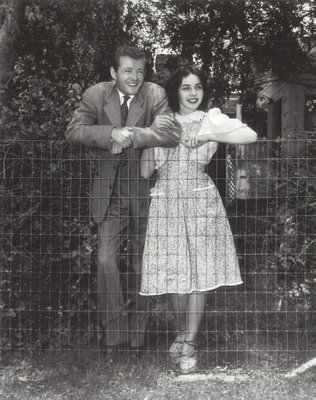
As you may have gathered from that dose of overheated prose, my view of Jennifer Jones’ fame and fortune is more than tempered by an apprehension over just how she came by it. Talent was never at issue. I’ve always considered her one of the best actresses around, but it never seemed as though she got any fun out of it. Interviews were ordeals. Award ceremonies were anathema. Candids reveal a glum, if not miserable, sort of resignation. Now I ask all you Greenbriar readers who have previously won Oscars (and don’t be modest, we know you’re out there) --- is stardom worth all this? Maybe in the short term, but Jennifer must surely have carried that guilt over Robert Walker around like Pilgrim’s Progress. Of course, every cloud has a silver lining. If Bob hadn’t suffered so in his private life, we’d never have had Bruno Anthony, and that, as everyone knows, is one of the great movie performances of all time (and to think, Walker received not even a nomination for Strangers On A Train). No account of Jennifer Jones is complete without a consideration of Bob. After their split, he gave up even trying for normalcy. His was the great post-war epic of self-destruction and fall from grace. This color Screw You publicity pose sums it up nicely, especially as counterpoint to the optimism he projects in the shot of he and Jennifer during happier days. She’s 87 now --- do you suppose she thinks much about the poor guy? There were two sons. One of them is a dead ringer for Bob. A lot of writers have approached Jennifer Jones about books they're writing. Would she co-operate? No chance --- as in no chance in hell. We’ll see Jennifer mulling over the career with Robert Osborne on TCM about the same day Deanna Durbin checks in for an hour with Larry King, which is to say, none of us are going to live that long.

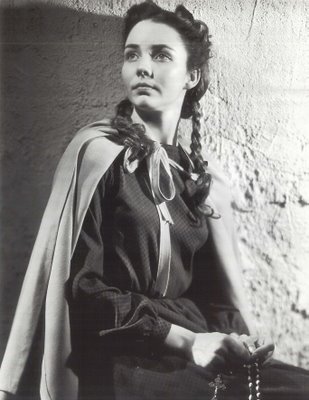
Selznick wasn’t the sort of producer who’d peruse the latest Three Mesquiteer westerns, so how could he know that his new protégé had gotten her start, not with him, but in the company of Ray Corrigan, Raymond Hatton, and a pre-major stardom John Wayne (in Republic's New Frontier). This was the shameful past Jennifer tried to conceal for months, though Selznick met her eventual and tearful confession with equanimity. He was by now committed both professionally and personally to the supreme effort of his career as an independent. Established majors abetted in the creation of Jennifer Jones. Fox gave her the coveted lead in The Song Of Bernadette, one of those assignments every woman, outside of Maria Ouspenskaya, desperately wanted. Popular and critical acclaim for a project so sumptuously mounted was a lead pipe cinch --- Bernadette fairly reeked of prestige. Jones had volunteered as a nurse’s aide prior to its release. Now she wouldn’t be able to go out of the house. Robert Walker was getting a big push at Metro around the same time. His Boy-Next-Door Goes To War was reassurance to mothers nationwide --- if this timid on-screen recruit could survive the fight, their own sons might as well --- and the gals, particularly teenage ones, went gaga for his non-threatening persona. Bob’s 4-F classification kept him out of the real-life conflict. This might not have been an altogether advantageous thing, for he’d not only co-star with an increasingly distracted wife, but would do so under the close supervision of the very man who had every intention of taking her away from him.
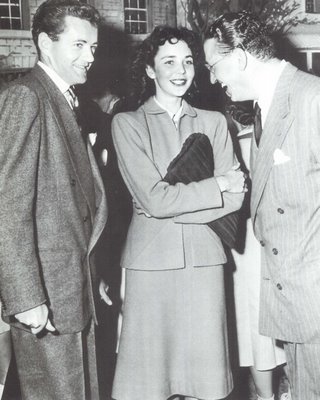
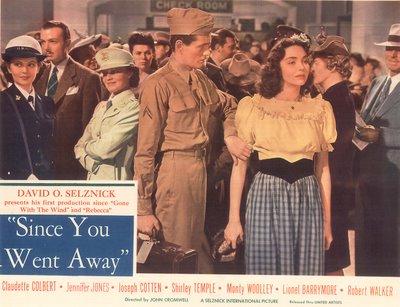
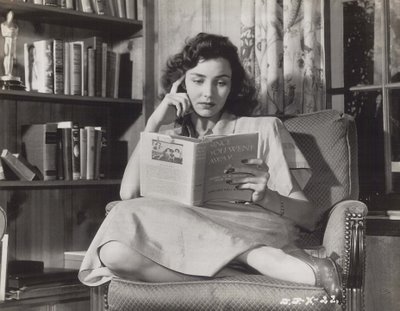
Since You Went Away was to be the home front Gone With the Wind. Jennifer Jones would be one of two teenage daughters (the other was Shirley Temple) representing a Saturday Evening Post concept of the American family. Publicity groupings of she and Temple with Claudette Colbert might have been captioned What We’re Fighting For, so idealized was this portrait of what screenwriter Selznick referred to as the Unconquerable Fortress, home. The producer’s behind-the-scenes conduct with regards family values, not only the Walker’s but his own, was like some grotesque parody of what he was depicting onscreen, and the emotional fall-out from all this would be felt by its participants for years to come. Walker had to play Selznick-constructed love scenes with his wife as the usurper of her affections stood on-set and watched. Surviving cast members would recall the almost unbearable tension five decades later. By the time Since You Went Away wrapped, and it seemed at times it never would, Jennifer Jones and Robert Walker were separated and he was laden with a torch and a bottle. He’d carry both for the rest of his short life. Selznick was a reluctant evictee from the home he’d shared with wife Irene Mayer Selznick, daughter of Louis B. Watching Since You Went Away can be a little unsettling when you’ve just come off reading biographies of these folks. What a raw deal Walker got.
Photo Captions
Robert Walker
Jennifer Jones
Phylis Isley with Ralph Byrd in Dick Tracy's G-Men
Jennifer Jones gets some more stage experience after her move to California
Jennifer Jones and Robert Walker
Poster Art of Jennifer as Bernadette by Norman Rockwell
Portrait of Jennifer as Bernadette
Robert Walker and Jennifer with David O. Selznick
Lobby Card --- Since You Went Away
Jennifer reads the novel of SYWA